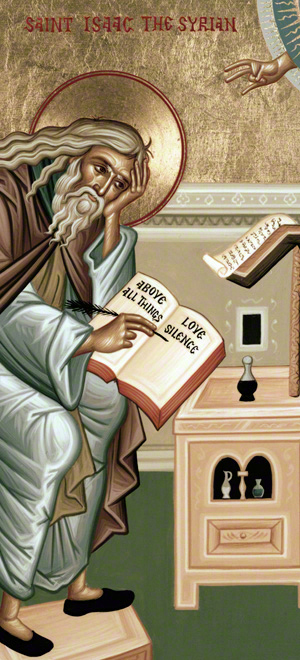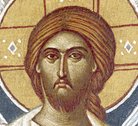 | ||
Holy Transfiguration Monastery Publications, Inside our Books and the Sources behind them, is a companion site to www.thehtm.org.
Copyright © 2012, Holy Transfiguration Monastery, Brookline, MA. All rights reserved. Home Page | About • Contact | Terms of Use
Saint Isaac the Syrian and his Writings

On Reading Saint Isaac the Syrian
Saint Isaac moves from subject to subject with great frequency, and as his subject changes, his style accommodates it, often becoming very difficult to grasp, as when he discusses spiritual states beyond our experience. Besides this is his Syriac idiom, which is foreign to many Western readers.
The following observations are offered as aids.
1. St. Isaac’s use of words is highly contextual. For example in Homily 51 zeal has a negative connotation and is the equivalent of fanaticism; in Homily 55 zeal is the guardian of virtue without which no one can progress spiritually. He himself defines his terms as context demands; in most cases all that is needed to decipher an initially baffling statement is to continue reading, and he himself will explains it in what follows.
2. Like all Syriac writers, St. Isaac likes to personify, e.g. “the fear of God will not be persuaded to dwell in a soul together with distraction over outward things,” (p. 114), “When knowledge cleaves to the love of the body . . .” (p. 396). This is an idiomatic and striking way of enunciating a general rule or conception. It can be a distraction at first, but becomes endearing when understood as a manner of speech characteristic of Syriac.
3. Read the Foreword, Introduction, and Glossary. They all enhance understanding of the text.
4. Note how often St. Isaac exhorts us to things that are within our ability – spiritual reading, showing kindness to one’s neighbor, avoiding great evils by not neglecting what seems small – and do not imagine that he is only writing for the greatest Saints who have passed beyond human weakness.
5. Read diligently, and over and over, and you will find that St. Isaac returns to the same themes in such a way that what was hard to grasp in an earlier passage is made plain by a later one. The more you read with concentration, the more you will see that passages scattered throughout the book mutually explain and illuminate each other.
6. Pray. The holy Elder Ieronymos of Aegina once gave a copy of the Ascetical Homilies to the blessed Irene Myrtidiotissa of Oinoussai. After she had read it he asked her what she understood of it. Nothing. He said he would pray for her, told her to pray, and had her read it again. This time she had some questions to ask him. After continuing to pray for enlightenment and reading it a third time, she said that she had begun to understand it.
